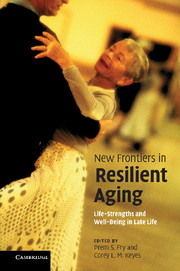Book contents
- Frontmatter
- Contents
- Figures
- Notes on contributors
- Foreword
- Acknowledgments
- Introduction
- 1 Sources of human life-strengths, resilience, and health
- 2 Growth is not just for the young: growth narratives, eudaimonic resilience, and the aging self
- 3 Physical resilience and aging:
- 4 You can teach an old dog new tricks:
- 5 Resilience in the face of cognitive aging:
- 6 Why do some people thrive while others succumb to disease and stagnation?
- 7 Psychosocial resources as predictors of resilience and healthy longevity of older widows
- 8 Resilience and longevity:
- 9 The socioemotional basis of resilience in later life
- 10 Emotional resilience and beyond:
- 11 Risk, resilience, and life-course fit:
- 12 Resilience in mobility in the context of chronic disease and aging:
- 13 Positive aging:
- Index
Introduction
Published online by Cambridge University Press: 06 December 2010
- Frontmatter
- Contents
- Figures
- Notes on contributors
- Foreword
- Acknowledgments
- Introduction
- 1 Sources of human life-strengths, resilience, and health
- 2 Growth is not just for the young: growth narratives, eudaimonic resilience, and the aging self
- 3 Physical resilience and aging:
- 4 You can teach an old dog new tricks:
- 5 Resilience in the face of cognitive aging:
- 6 Why do some people thrive while others succumb to disease and stagnation?
- 7 Psychosocial resources as predictors of resilience and healthy longevity of older widows
- 8 Resilience and longevity:
- 9 The socioemotional basis of resilience in later life
- 10 Emotional resilience and beyond:
- 11 Risk, resilience, and life-course fit:
- 12 Resilience in mobility in the context of chronic disease and aging:
- 13 Positive aging:
- Index
Summary
This volume addresses the topic of “new frontiers in resilient aging,” which is of ever-increasing significance in current gerontological and geriatric discourse and research. The topic is not only very complex, but has enormous scope and breadth, encompassing a number of psychosocial and biological models of aging, theoretical formulations, definitions, and dimensions of resilience, and the core determinants of resilience that lay the foundations for discourse and research. Resilience as a psychological construct emerged from the study of children and youth at risk, and discourse on resilience, adaptation, and healthy longevity has focused mainly on younger adults, perhaps because of a misconception that resilience capacities diminish rapidly and perhaps irreversibly after young adulthood. Currently, increased life-expectancy without the compression of morbidity and vulnerability, together with the rising costs of healthcare, has highlighted the need for greater attention to the capacity for resilience throughout adulthood and in late life.
More recently, factors that influence resilience in later life are being studied more extensively. Within the last few years the theme of resilience in an aging society has been featured prominently in a number of national and international conferences and is the subject of intensive study in institutes of health sciences, mental health, and gerontology. This confluence of events suggests that the time is ripe to highlight some of the more recent and important research and writing on the topic of resilience in later life, and to bring the strands of this rapidly emerging scholarship together to showcase the movement toward promoting healthier aging.
- Type
- Chapter
- Information
- New Frontiers in Resilient AgingLife-Strengths and Well-Being in Late Life, pp. 1 - 14Publisher: Cambridge University PressPrint publication year: 2010
- 3
- Cited by



